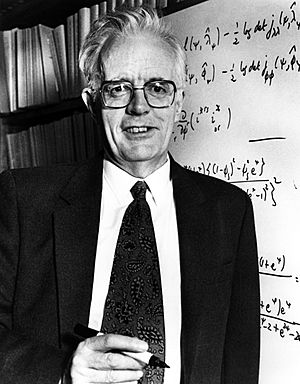David Cox (statistician) facts for kids
Quick facts for kids
David Cox
|
|
|---|---|

Cox in 1980
|
|
| Born | 15 July 1924 Birmingham, England
|
| Died | 18 January 2022 (aged 97) |
| Alma mater | |
| Known for |
|
| Spouse(s) |
Joyce Drummond
(m. 1947) |
| Children | 4 |
| Awards |
|
| Scientific career | |
| Fields | Statistics |
| Institutions |
|
| Thesis | Theory of Fibre Motion (1949) |
| Doctoral advisor |
|
| Doctoral students |
|
Sir David Roxbee Cox (born July 15, 1924 – died January 18, 2022) was a famous British expert in statistics. He was also a great teacher. He made many important discoveries in statistics. These include logistic regression, the proportional hazards model, and the Cox process. The Cox process is even named after him!
He taught statistics at several well-known universities. These included Birkbeck College, Imperial College London, and the University of Oxford. He was also the head of Nuffield College, Oxford.
Sir David was the very first person to win the International Prize in Statistics. He also received many other important awards. These included the Guy, George Box, and Copley medals. He was also made a knight.
Contents
Early Life and Education
David Cox was born in Birmingham, England, on July 15, 1924. His father worked as a die sinker and owned part of a jewelry shop. They lived close to the Jewellery Quarter.
He went to Handsworth Grammar School in Birmingham. Later, he studied mathematics at St John's College, Cambridge, where he earned his Master of Arts degree. He then went on to get his PhD from the University of Leeds in 1949. His main advisors were Henry Daniels and Bernard Welch. His PhD paper was called Theory of Fibre Motion.
His Amazing Career
David Cox started his career working at the Royal Aircraft Establishment from 1944 to 1946. After that, he worked at the Wool Industries Research Association in Leeds until 1950. From 1950 to 1955, he worked at the Statistical Laboratory at the University of Cambridge.
In 1956, he became a professor of statistics at Birkbeck College, London. He stayed there until 1966. Then, he moved to Imperial College London to lead the statistics department. He later became the head of the whole mathematics department there.
In 1988, he became the head of Nuffield College, Oxford and joined the Department of Statistics at Oxford University. He officially retired in 1994. However, he kept working and contributing to statistics at Oxford.
Sir David was known for helping and working with many other important researchers in statistics. He worked with George Box on special math tools called transformations. One of these is famously known as the Box–Cox transformation. He also guided many students who became successful statisticians themselves.
He was also the president of several important statistical groups. These included the Bernoulli Society, the Royal Statistical Society, and the International Statistical Institute.
Personal Life
In 1947, David Cox married Joyce Drummond. They had four children together. He passed away on January 18, 2022, when he was 97 years old.
What He Studied
Sir David Cox made many important discoveries in statistics. Here are some of his most famous contributions:
- Logistic regression: This is a special way to predict things when the answer is a category. For example, it can predict if something will be a "success" or "failure," or if someone has a "disease" or "no disease." It can also help with things that can be ranked, like how bad pain is (mild, moderate, severe). Cox's work in the 1950s and 60s helped develop this method.
- Proportional hazards model: This model is very important for studying "survival data." This means looking at how long something lasts or how long it takes for an event to happen. For example, in medical research, it can help doctors understand how long patients live after a certain treatment. It can also show how different factors affect survival time. Sir David developed this model in 1972.
- Cox process: This is a type of mathematical process that helps understand patterns of events that happen randomly over time or space. It was named after him because of his important work on it.
Awards and Honors
Sir David Cox received many awards for his amazing work.
- He won the Guy Medal from the Royal Statistical Society twice. First, the Silver medal in 1961, and then the Gold medal in 1973.
- In 1973, he became a Fellow of the Royal Society of London, which is a very high honor for scientists.
- He was made a knight by Queen Elizabeth II in 1985. This meant he could use the title "Sir."
- In 1990, he won the Kettering Prize and Gold Medal for Cancer Research. This was for creating the Proportional Hazard Regression Model, which helps in cancer studies.
- He received the Copley Medal from the Royal Society in 2010. This award is given for outstanding achievements in science.
- He was the very first person to receive the International Prize in Statistics in 2016. This is like the "Nobel Prize" for statisticians.
- Also in 2016, he won the BBVA Foundation Frontiers of Knowledge Award. He shared this award with Bradley Efron. They were recognized for creating "pioneering and hugely influential" statistical methods. These methods are now used in many fields, from medicine to space science.
He was also a member of many other important scientific groups around the world, including the American Academy of Arts and Sciences and the US National Academy of Sciences.
See also
- Logrank test
 | DeHart Hubbard |
 | Wilma Rudolph |
 | Jesse Owens |
 | Jackie Joyner-Kersee |
 | Major Taylor |

